Jesse Richards's Blog, page 3
February 29, 2016
Landmark Environmental Deal
I saw a video clip someone Facebooked recently showing how bad Beijing's smog is. It was a hyperbolic news segment that noted that "this is what an average day looks like here" while also mentioning at the end that they filmed on the record worst day of the year.
China has a real pollution problem, and it's terrible, but it doesn't worry me. That's a soluble problem. It's one we've solved before. As an Occupy Democrats post put it, "Woah! Think Beijing is smog-choked? Well NYC used to be just as bad. Many Americans have forgotten just how smoggy many of our cities were until Nixon signed the Clean Air Act in 1970. It took some time to really get off the ground, but its positive effects today are crystal clear."
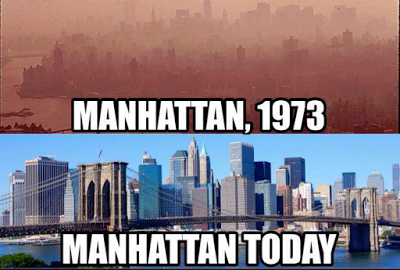
The people of China have been desperate to climb out of poverty, so they made a choice to sacrifice the environment in the short-term. Just like developed countries around the world, once their citizens acquire a certain amount of wealth, they will start to prioritize a cleaner environment, and then take the steps to make it happen. (This is, of course, a simplification. Not everyone in China was able to participate in that choice. It's a choice they've made as a society, and not a democratic one.)
Here are some more photos of smoggy 1970s America.
Of course, this argument only holds water if there are no long-term negative externalities to this much pollution. As we know now, there are, of course: 1) the pain and death directly caused by air pollution and 2) climate change.
The first point is terrible but needs to be compared to the pain and death caused by poverty. I haven't done that math, but again, economists would say that millions of people are choosing the former over the latter. They would rather have pollution than poverty. The alternative to pollution in China is not just beautiful blue skies and scenic rural landscapes. It's the poverty that comes with those, until the country is able to eventually afford to adjust its development in a cleaner direction.
The second point, climate change, we're finally starting to see some action on. That's why it was reassuring to see the landmark Paris deal two months ago. It's not the final step, but it's still a step in the right direction.
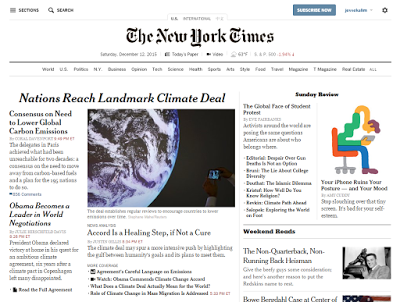
January 24, 2016
One round of Global Goals done, now it's time for the next
The reason that I called my book The Secret Peace is that while the world has been making unprecedented progress, many of us remain completely unaware of this transformation. As Nicholas Kristoff reports:
One survey found that two-thirds of Americans believed that the proportion of the world population living in extreme poverty has almost doubled over the last 20 years. Another 29 percent believed that the proportion had remained roughly the same.
That’s 95 percent of Americans — who are utterly wrong. In fact, the proportion of the world’s population living in extreme poverty hasn’t doubled or remained the same. It has fallen by more than half, from 35 percent in 1993 to 14 percent in 2011 (the most recent year for which figures are available from the World Bank).
A big driver of this change has been the UN Millennium Development Goals, which helped focus aid efforts and countries' priorities to focus on what matters most. Each country had specific targets in eight different topic areas. This creates hundreds of individual goals, and not all of them were met. But, against seemingly-impossible odds, the majority were.
The world has agreed on a new set of goals, the Global Goals. These 17 goals are even more ambitious - but achievable. It's a good idea for us all to familiarize ourselves with them, to be aware of the progress most of the world is focusing on.
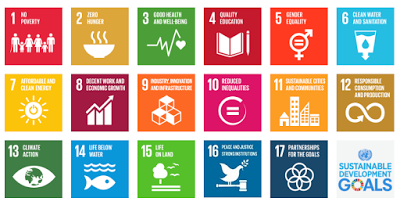
January 10, 2016
Progress in Southeast Asia
Two recent incredible developments in Southeast Asia. First, ten countries recently signed a pact to form a European-Union-style organization. The countries - Brunei, Cambodia, Indonesia, Laos, Malaysia, Myanmar, the Philippines, Singapore, Thailand, and Vietnam - have a population of over 600 million, which is more than the EU itself.
Obviously there are always pros and cons to such an arrangement, but history shows that closer economic ties between countries lead to more development and less conflict overall.
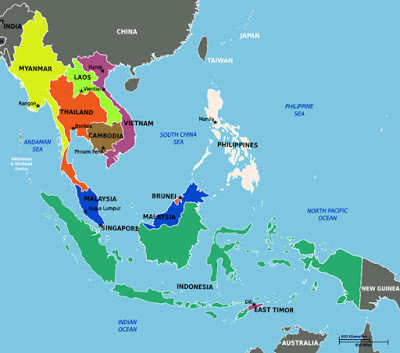
In more immediate, concrete news, the military dictatorship in Myanmar was recently defeated in a fair election and seems due to concede power to a more democratic system. The New York Times reports:
The official results are still being tabulated, but all signs so far point to that rarest of things: an authoritarian government peacefully giving up power after what outside election monitors have deemed a credible vote.
Analysts and Myanmar’s citizens are still coming to grips with the results. But the outcome appears to stem from the simple fact that veneration for Ms. Aung San Suu Kyi was underestimated and the ruling party’s strength overestimated.
In the days before the elections, the ruling party organized large convoys of tractors to ride through the countryside. Thousands of farmers, wearing T-shirts given out by the party, chanted slogans and waved party flags. Wedding bands performed patriotic songs.
But that show of support was misleading. Many of the farmers said they had taken part in the rallies because they were paid, but when it came time to stamp their ballots, they voted for the National League for Democracy.
December 24, 2015
Everyday interactions
One of my friends posted this on Facebook recently and I thought it was very in the spirit of this blog:
Last night while taking the "G" train in Brooklyn, I observed New Yorkers interacting with one another. There was a Japanese-American woman talking to her infant child in a pram and standing next to her were three smartly dressed business men. The men began to interact with the baby and appeared to be competing to see who would be the first to make the baby laugh. On the opposite side were four teenage girls laughing and talking about their afternoon school concert. When we reached the end of the subway line and everyone departed the subway car, I saw one of the teenage girls walk over to the mother with the baby to help her lift and carry the baby pram up a flight of stairs.
My experiences with New Yorkers are no different then my experiences with folks from anywhere else. In lieu of recent horrible remarks made about certain ethnic groups, I want to mention that the teenage girl and one of the business men were of Middle-Eastern descent.
After spending the day with my three month old grandson, it was delightful to watch the three handsomely dressed adult men trying to make a baby laugh in a loud subway car and heartwarming to see the teenager reach out to help carry a stranger's baby pram up a flight of stairs. There is so much goodness in the world.
December 22, 2015
What do you wish for this year?
The holiday season and New Year are the traditional time to re-examine what we want in our lives. When you're thinking about which gifts you want and what gifts to buy your loved ones, keep in mind that everyone's deep, core desires are basically the same - all around the earth.
Here's a heartwarming Wait But Why video that proves that point well.
November 30, 2015
Are terrorists going to kill us all?
It's easy to be worried when shockingly dangerous events happen. From 2002 to today, an average of 31 Americans were killed by terrorists each year. Well sure, you say, I purposely excluded 2001. Ok fine, including 2001, it's an average of 270 Americans a year.
270 Americans a year sounds like a lot until you realize that:
11,000 Americans are murdered by guns every year (excluding accidents and suicides)33,000 Americans are killed in car accidents every year38,000 Americans are killed by accidental poisoning every year58,000 Americans die due to a diet too low in fruits and vegetables every year90,000 Americans die due to alcohol every year467,000 Americans die due to smoking every year.There needs to be a way to advocate for fewer resources to fight terrorism without sounding like an advocate for zero resources to fight terrorism. We should put up a fight proportionate to the problem. We should definitely have lots of money and teams of experts devoted to fighting terrorism, and we should have even more devoted to fighting, say, car accidents.
We also need news headlines that reflect, not distort, life's true risks. Not only is violence not likely to kill us, it's less likely than it's ever been.
So remember, the next time you see someone who you suspect may be a terrorist, play it safe by not accepting any cigarettes from them.
Here are some illuminating charts:
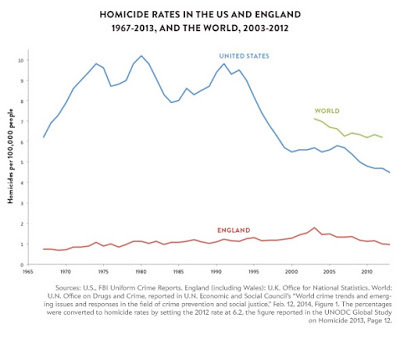
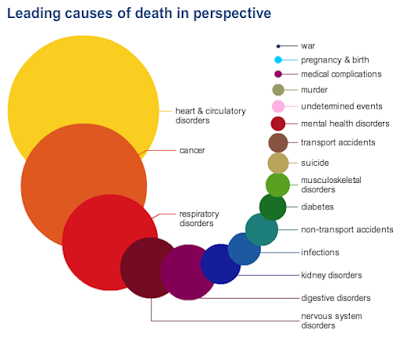
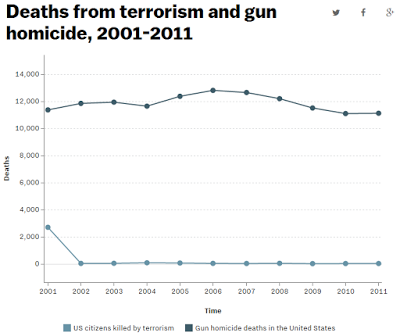
Sources / related articles:
Deaths from gun violence vs. deaths from terrorism, in one chart
The things most likely to kill you in one infographic
Smoking, high blood pressure and being overweight top three preventable causes of death in the U.S.
August 31, 2015
Women get the right to vote
If you thought 1920 was a reprehensibly late date to get the right to vote, what about 2015? This December is poised to be the first time that Saudi Arabian women will finally be able to vote and run for office.
According to this Time article, an estimated 70 women are looking to run as candidates in the country's municipal elections.

I liked this stock photo since it clearly showed Saudi women
plotting to overthrow the government via their newfound powers.
Lest you think that this means everything's hunky-dory in one of the most conservative and restrictive countries in the world, remember that Saudi woman still can't drive cars, go out in public without a male chaparone, wear whatever they like, and many other common, sensible tasks. Hopefully, they will soon vote to relax these rules.
August 6, 2015
Colorado's startling success in curbing teenage births
From Futurific Leading Indicators, August 2015: "Over the past six years, Colorado has found that if teenagers and poor women were offered free intrauterine devices and implants that prevent pregnancy for years, women will choose them in a big way, and the results are startling."
"The birthrate among teenagers plunged by 40 percent from 2009 to 2013, while their rates of abortions fell by 42 percent. ... There was another similar decline in births for another group particularly vulnerable to unplanned pregnancies: unmarried women under 25 who have not finished high school. The changes were particularly pronounced in the poorest areas of the state."
"Teenage births have been declining nationally [see my previous post from two years ago], but experts say the timing and magnitude of the reductions in Colorado are a strong indication that the state's program was a major driver. About 20 percent of women ages 18 to 44 in Colorado now use a long-acting method ... compared to about 7 percent nationwide. ... About half of the 6.6 million pregnancies a year in the United States are unintended."

June 9, 2015
Who are worse drivers, women or men?
I was out for drinks with coworkers and talking about last week's blog post, which complains about cars. Being New Yorkers as well, most of my coworkers were sympathetic. But then the conversation took a surprising turn. One guy mentioned that there was one thing he would never do: get in a car with a woman behind the wheel. Women are terrible drivers.
This made me livid, and I immediately lambasted him for such a sexist claim. Perhaps that's something you would hear when hanging out with a group of friends, but with coworkers? And there was a woman in the group, as well! Most of us can see that this would normally be considered inappropriate.
I immediately took out my phone and started looking up stats to prove that, in fact, men are worse drivers. I didn't know this already, but assumed it must be the case. And it was. In nearly every measurable factor, men are worse drivers than women:
Men tend to have more crashesMens' crashes tend to be more seriousMen are more likely to speedMen are more likely to drive while intoxicatedMen are more than twice as likely to have fallen asleep at the wheelAnd this is why, naturally, men's insurance premiums cost more than women's. Like many "secret" trends, it's surprising how straightforward these stats are, and how simple to find. (You can trust that a subject will be well-measured and analyzed whenever there is money riding on it.) Yet, many people still insist on holding inaccurate beliefs.
(There are many stats about this online that agree; here is the source for those above. And, despite what my coworker tried to rebut, the stats are based on rates, not absolute numbers, so the number of drivers doesn't matter.)
Trouble is, in retrospect I realized that I argued the case all wrong.
It doesn't matter that men are in reality worse drivers than women. Knowing this, would someone now make the decision to never get in a car with a male driver? No, that would clearly be absurd.
The reason it's absurd is that we've all been trained to think of men as individuals, not as a group. Some men may be bad drivers, but we can all realize that this doesn't mean ALL men are, and we can all think of examples of men who are good drivers.
That line of thought is a logical, good thing. What's sad is how much harder it is for some people, such as my coworker, to apply the same logic to women. It's unlikely that there are any women who "would never get in a car with a man behind the wheel", even though - surprise! - they would be at least a bit more justified in that than my coworker is with the opposite.
My coworker's worst crime, his biggest flaw in logic, was not in thinking women were worse drivers than men - they very well could have been, on average. It was extrapolating an average characteristic of a group to apply to every single member of that group.
This is the root of all sexism, racism, and prejudice of any kind. There are always two flaws in logic at work - the details of the assumption, and the fact that you're making an assumption at all. Of the two, the latter is worse. After all, the details of the assumption may very well be positive, but it would still be incorrect to make an assumption. Even if a statement about a group is true on average, you can't extrapolate that to individual members of the group.
Our mission should not be to inform people that, in fact, men are worse drivers than women. They are, on average, but it doesn't matter at the individual level. Our goal should be to realize that assumptions never apply to individuals. Group-level information is still useful, of course, to identify trends and work on solutions. But if I'm about to get in a car with a male driver, there is no way I can correctly guess if he is a good or bad driver based solely on his gender, or aggregate statistics about any of the groups he belongs to.
What's the Secret Peace trend here? Just the trend that more and more people are making this realization and refraining from group stereotypes (you can reference the equality chapter of my book for lots of stats on that.) It was nice when out at the bar to hear that none of my other coworkers joined in the sexist argument; in fact, the only reason it was so notable is that it was an anomaly.
May 31, 2015
Cars are terrible ... but there is hope
I read an Earth Institute report recently, "Transforming Personal Mobility", that, well, transformed the way I think about personal mobility. (Also known as: cars.)
Last week, an Amtrak train derailed spectacularly, and this was rightly treated as huge news, an unbelievable disaster. The death toll was 8 people, sadly. Meanwhile, cars kill 35,000 people a year in the US alone, but this is never news. That terrible number is actually a huge improvement over previous decades, believe it or not, and other countries have it worse. In total worldwide, cars kill 1.2 million people a year (and injure countless others). No one seems to think this is a problem. There are no news stories about it, no one is in front of the White House picketing cars. We all just accept that this is a totally normal price to pay for the convenience of personal transportation.
The sheer inefficiency of cars is a huge contributor to global warming, wasted energy, and air pollution. Manufacturing them uses huge amounts of energy as well: building one for every person, and then every few years, building another one for every person.
In addition, cars are also extremely expensive per person, not least because of the insurance required (due to all that aforementioned death). If subways or trains or buses were available and efficient everywhere in the country, an individual doing a cost/benefit analysis would rarely opt to own a car.
Cars also have more subtle consequences that are no less awful. Increasingly, evidence is showing that long commutes make people miserable. These commutes are long (even if they're not by car, though most are) because our suburbs have been designed based on the concept of cars. I just finished the Pulitzer Prize-winning The Power Broker, which examined the deadly consequences of destroying urban communities to put highways in cities, as we did throughout the twentieth century. The book posits that over-investment in highways (and thus, less funding for schools, hospitals, and police) and their disruption of communities contributed to New York's decline and crime wave in the 1970s and '80s. Only recently have we started learning better ways to organize cities and undue that damage.
Wait, there's more. Think of all the space wasted by parking garages, and the ugly blight of street parking. Cars line every street in every city, doing nothing but taking up space. The vast majority of people who own cars use them primarily for commuting, meaning they sit idle 90% of every day, decaying.
Lastly, consider the geopolitical implications if we weren't as reliant on oil. At a minimum, several dictators worldwide might have a harder time holding onto power, and we wouldn't need to help them. The people who argued that the Iraq war(s) were ALL about oil never made sense to me, but nor do those who deny it played any part at all. Oil is always at least a factor. To sum up, self-owned, self-driven cars:Kill and injure millions of people.Are a huge contributor to global warming.Are responsible for much of our air pollution.Drastically increase our energy needs.Are unecessarily expensive.Make people miserable.Take up lots of room.Destroy cities and communities.Encourage wars and prop up terrible regimes worldwide. So how can we transform this dire situation? Well, one possibility emerges as a plausible solution if the following trends continue: Right now, ride-hailing apps such as Uber (ugh) and Lyft are booming. They make it easy to just press a button and get a car to appear at your doorstep and take you where you want to go.Other alternatives to owning a car, such as ride-sharing and temporary rentals like Zipcar, are emerging as well.Self-driving cars, advocated by Google, are finally on the cusp of availability. Eventually, they will likely become mainstream.We are all now addicted to social media and entertainment and would much rather watch a movie and tweet about it than drive. (I enter as evidence all the car accidents now caused by people texting.)We are also pretty desperate for more free time. Where do those lead us? Let me walk you through one way the future might go: Once self-driving cars become legal, companies like Uber jump on them. Their expenses will go way down if they don't have to pay drivers, nor do they have to worry about variable quality.Individuals buy self-driving cars, too. It's much more pleasant to watch a movie on the way to work (or even do work) than drive. This change alone doesn't help the environment or our energy needs, but it will quickly improve safety. Once perfected, self-driving cars will be much better drivers than us humans.Once a critical mass of self-driving cars are on the streets, accidents decrease, and as a result, insurance premiums could go down. With the money saved, more people can afford new, self-driving cars (ideally, in the form of upgrades to existing cars.)Now accustomed to not driving cars themselves, people grow less attached to them. If they are no longer an extension of our wills and decisions, they will no longer seem like extensions of ourselves. This creates an environment ripe for many companies, or even the government, to offer self-driving on-demand rides like Uber and Lyft. Without drivers, these organizations could afford more cars on the street, making their service even better. They would be able to extend their service to more suburban areas, not just city downtowns.The cost of using that service is so much less than owning a whole car, that many people switch. Here's the epiphany: Eventually, we have a world in which no one owns a car, but just requests a driverless one on-demand whenever they need a ride.
The streets would be filled with these cars; there is always one available instantly. The interior of each car adjusts to each person's personal settings, and is a rolling workstation/entertainment center. You could watch a movie or conduct a meeting in one; some might even offer lunch. No one will ever waste time commuting, since commuting will just consist of doing whatever we were doing anyway, but in motion. Regular commuters would have pickups scheduled, with no risk of unavailability. The number of cars on the streets would be the same as today, but each car would be more energy-efficient than a mistake-prone human driver. One-person trips would use smaller cars, that don't have to be larger based on the off-chance four people need a ride. There would be no need for parked cars at all - just like how you don't see many parked taxis today - the fleet is always in motion. So the total number of cars manufactured would be much fewer. This would free up millions of acres of room and just plain make all our streets look better.
The main downside is that self-driving cars would put a lot of people - taxi drivers, chauffeurs, truck drivers - out of work. Hopefully the transition would be gradual. And the savings would be equally spread to all car users. Only the world's richest people can afford to have drivers waiting on them today; soon, an equivalent could be available to all of us for a fraction of the cost.
At no point would we need to make people-driven, individually-owned cars illegal, of course. Compelling incentives to voluntarily change are always better than a ban. A few eccentric people would probably continue to own and drive cars, just like today's vinyl record-collecting hipsters or the few superstitious writers still using typewriters. Eventually, these drivers would be shunned for the risk they put everyone else in.
I haven't driven a car in almost ten years. I'm excited for the possibility that by the time my daughter reaches driving age, this will have become the norm instead of the exception.



